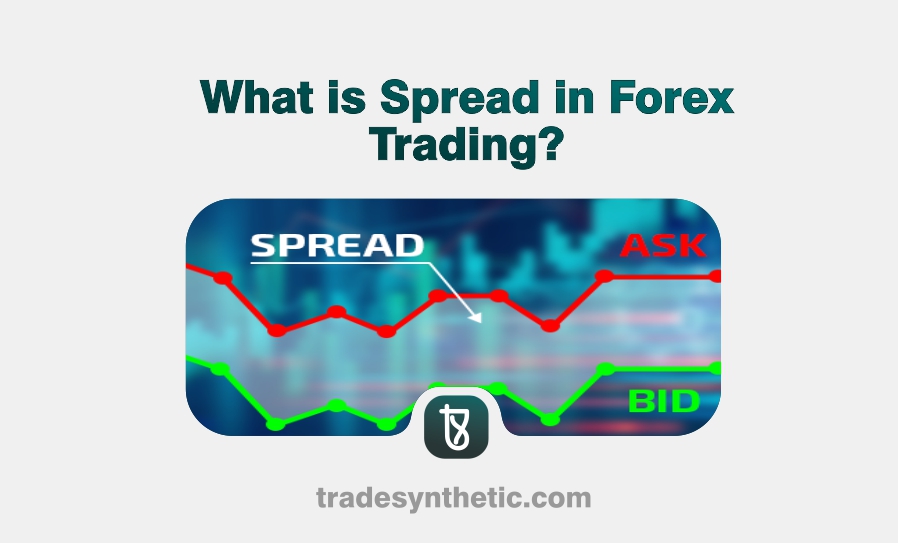Over the years of my trading experience, many forex traders have asked, “What is spread in forex trading?” If you’ve ever checked a forex trading platform, you’ve likely seen two prices for each currency pair: the bid price and the ask price. The spread in forex trading is the difference between these two prices. It represents the cost of entering a trade and is one of the keyways brokers make money.
Understanding the forex spread is important because it affects your trading costs, profitability, and overall strategy. In this article, we’ll explore what spread in forex means, how it works, the factors that influence it, and how you can manage spreads effectively and keyways to improve your trading success.
What is Spread in Forex Trading?
The spread in forex trading is the difference between the bid price (the price buyers are willing to pay) and the ask price (the price sellers are willing to accept) for a currency pair. It is measured in pips, the smallest unit of price movement in forex.
For example, if the EUR/USD pair has a bid price of 1.1050 and an ask price of 1.1052, the spread is 2 pips.
Why Does Spread Matter?
- It determines your trading cost.
- The tighter the spread, the lower your cost.
- A wider spread means higher costs, which can reduce your profits.
Types of Spreads in Forex Trading
Forex traders typically encounter two main types of spreads: fixed spreads and variable spreads.
Fixed Spread
A fixed spread remains the same regardless of market conditions. Brokers offering fixed spreads often act as market makers, meaning they set the bid and ask prices themselves.
Advantages of Fixed Spreads
- More predictable trading costs
- Useful for beginner traders
- Lower risk of spread widening during volatile markets
Disadvantages of Fixed Spreads
- Higher overall spread compared to variable spreads in normal conditions
- Limited trading flexibility during major news events
Variable Spread
A variable spread, also known as a floating spread, constantly changes based on market conditions. It is commonly offered by ECN (Electronic Communication Network) brokers, who connect traders directly to the forex market.
Advantages of Variable Spreads
- Tighter spreads in stable market conditions
- More transparency in pricing
- Suitable for scalpers and high-frequency traders
Disadvantages of Variable Spreads
- Spreads can widen during high volatility
- Less predictable trading costs
How is Forex Spread Measured?
Forex spreads are measured in pips, which represent the smallest price movement of a currency pair. In most forex pairs, 1 pip = 0.0001, while for JPY pairs, 1 pip = 0.01.
Example of Spread Calculation:
If EUR/USD has:
- Bid Price: 1.1050
- Ask Price: 1.1052
- Spread: 2 pips
If USD/JPY has:
- Bid Price: 110.10
- Ask Price: 110.15
- Spread: 5 pips
Spreads can also be displayed in pipettes, which are one-tenth of a pip. Some brokers quote prices in five decimal places instead of four, offering more precise pricing.
Factors That Affect the Spread in Forex Trading
Several factors can influence the spread, making it important for traders to understand what impacts their trading costs.
1. Market Volatility
During times of high volatility, such as major news releases or economic events, spreads tend to widen. This happens because there is uncertainty in the market, causing price fluctuations.
2. Liquidity
The more liquid a currency pair is, the tighter the spread. Major pairs like EUR/USD and GBP/USD typically have lower spreads because they are traded in high volumes. Exotic pairs, like USD/ZAR, tend to have higher spreads due to lower liquidity.
3. Trading Session
Spreads can vary depending on the trading session. The London and New York sessions usually have the tightest spreads due to higher trading activity, while the Asian session may have wider spreads.
4. Broker Type
Different brokers offer different spread structures:
- Market Makers: Usually offer fixed spreads.
- ECN/STP Brokers: Offer variable spreads that change based on market conditions.
How to Manage and Reduce Forex Spreads
To minimize trading costs, you need to learn how to manage spreads effectively. Here are some strategies to reduce the impact of spreads on your trades.
1. Trade During High Liquidity Hours
Forex spreads are usually lowest during the London and New York trading sessions, when market activity is high. Avoid trading during off-peak hours, as spreads tend to widen.
2. Choose the Right Broker
Selecting a broker with low and competitive spreads is crucial. Look for an ECN/STP broker if you prefer variable spreads or a market maker if you want fixed spreads.
3. Avoid Trading During High Volatility Events
Spreads tend to widen during major news events like interest rate decisions and economic reports. If you’re a beginner, it’s best to avoid trading during these periods.
4. Use Limit Orders Instead of Market Orders
Market orders are executed at the current ask or bid price, meaning you might get a price with a higher spread. Using limit orders allows you to enter trades at your preferred price, reducing your cost.
5. Consider Trading Major Pairs
Major currency pairs, such as EUR/USD, GBP/USD, and USD/JPY, have the lowest spreads because they have the highest liquidity. Avoid trading exotic pairs unless necessary, as they come with higher spreads.
Conclusion
In summary,the spread in forex trading is one of the most important factors that affect your trading costs and profitability. Since it represents the difference between the bid and ask price, knowing how it works helps you make informed decisions.
To succeed in forex trading, ensure you:
- Trade during high liquidity sessions
- Choose a broker with low spreads
- Avoid trading during high volatility periods
- Use limit orders to reduce spread costs
By applying these strategies, you can effectively manage spreads and maximize your profits in forex trading.
Frequently Asked Questions (FAQs)
What is a good spread in forex trading?
- A good spread depends on the currency pair and market conditions. For major pairs like EUR/USD, a spread of 1-2 pips is considered good, while for exotic pairs, a spread of 5-10 pips is common.
Why do spreads widen?
- Spreads widen during high volatility (e.g., news events), low liquidity periods (e.g., aftermarket hours), or due to broker policies.
Do all brokers offer the same spreads?
- No. Market maker brokers typically offer fixed spreads, while ECN/STP brokers provide variable spreads that change based on market conditions.
How does spread affect my forex trading profit?
- A wider spread increases your trading cost, meaning you need a larger price movement in your favor to make a profit. Lower spreads help you reduce costs and improve profitability.
Can I trade forex without paying spreads?
- Some brokers offer zero-spread accounts, but they charge commissions instead. Always compare the total cost (spread + commission) before choosing a broker.










